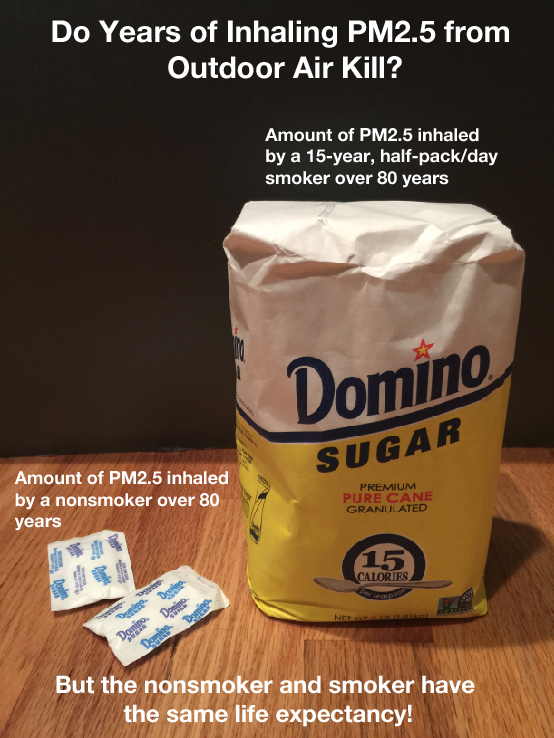I pointed this out in my Amazon.com best seller, “Scare Pollution: Why and How to Fix the EPA.”

So you can smoke (each cigarette is a massive PM2.5 exposure) until you are age 35, quit, and then by age 50 have normal life expectancy (i.e., have the CV disease risk of a never-smoker) — despite inhaling 4+ pounds of PM2.5 as a smoker. For comparison, a non-smoker inhales about 2 ounces of PM2.5 over the course of an 80-year lifespan.
I know people get queasy talking about smoking, but the data are the data.
###
The media release is below.
If you smoke, now is a very good time to quit
American Heart Association Meeting news brief — Poster Presentation Su1116 — Session: EP.APS.24
AMERICAN HEART ASSOCIATION
DALLAS, Nov. 5, 2018 — For former smokers it took more than 15 years for cardiovascular disease risk to return to the level of those who never smoked, according to preliminary research to be presented in Chicago at the American Heart Association’s Scientific Sessions 2018, a premier global exchange of the latest advances in cardiovascular science for researchers and clinicians.
Cigarette smoking in the United States is on the decline, which means there are more former smokers. Studies to date suggest that the increased risk for cardiovascular disease in smokers diminishes a few years after quitting, but those studies have not been able to look as closely at smoking history, including changes in smoking habits such as variations in cigarettes smoked per day, or quitting followed by relapse to smoking.
In this study, researchers analyzed information, including lifetime smoking history, of nearly 8,700 participants of the Framingham Heart Study who were free of cardiovascular disease at the start of the study. The midpoint of follow-up among participants was 27 years, during which cardiovascular disease risk was compared among current, former and never smokers.
Researchers found:
- More than 70 percent of cardiovascular disease events in current or former smokers occurred among those who smoked at least 20 pack-years, which is the equivalent exposure of one pack a day for 20 years.
- Former smokers who had quit within the last five years reduced their cardiovascular disease risk by 38 percent compared to those who continued to smoke.
- It took 16 years since quitting for former smokers’ risk of cardiovascular disease to return to the level of never smokers.
“These findings underscore the benefits of quitting smoking within five years, which is 38 percent lower risk of a heart attack, stroke, or other forms of cardiovascular disease risk compared to people who continue to smoke. We also found that cardiovascular disease risk remains elevated for up to 16 years for former smokers compared to people who have never smoked,” said Meredith Duncan, M.A., study author and Ph.D. student at Vanderbilt University Medical Center in Nashville, Tennessee. “The bottom line is if you smoke, now is a very good time to quit.”
###
Note: Scientific presentation is 2 p.m. CT, Sunday, Nov. 11, 2018.
Meredith Duncan, M.A., Vanderbilt University Medical Center, Nashville, TN
Additional Resources:
Images may be downloaded from the right column https://newsroom.heart.org/news/if-you-smoke-now-is-a-very-good-time-to-quit?preview=30faa38253af614ef191931e41a2289b
Tips to Quit Smoking
Smoking & Cardiovascular Disease (Heart Disease)
Men younger than 50: the more you smoke, the more you stroke
Smoking may increase heart failure risk among African Americans
For more news from AHA Scientific Sessions 2018, follow us on Twitter @HeartNews #AHA18.
Statements and conclusions of study authors that are presented at American Heart Association scientific meetings are solely those of the study authors and do not necessarily reflect association policy or position. The association makes no representation or warranty as to their accuracy or reliability. The association receives funding primarily from individuals; foundations and corporations (including pharmaceutical, device manufacturers and other companies) also make donations and fund specific association programs and events. The association has strict policies to prevent these relationships from influencing the science content. Revenues from pharmaceutical and device corporations are available at https://www.heart.org/en/about-us/aha-financial-information.
About the American Heart Association
The American Heart Association is a leading force for a world of longer, healthier lives. With nearly a century of lifesaving work, the Dallas-based association is dedicated to ensuring equitable health for all. We are a trustworthy source empowering people to improve their heart health, brain health and well-being. We collaborate with numerous organizations and millions of volunteers to fund innovative research, advocate for stronger public health policies, and share lifesaving resources and information. Connect with us on heart.org, Facebook, Twitter or by calling 1-800-AHA-USA1.